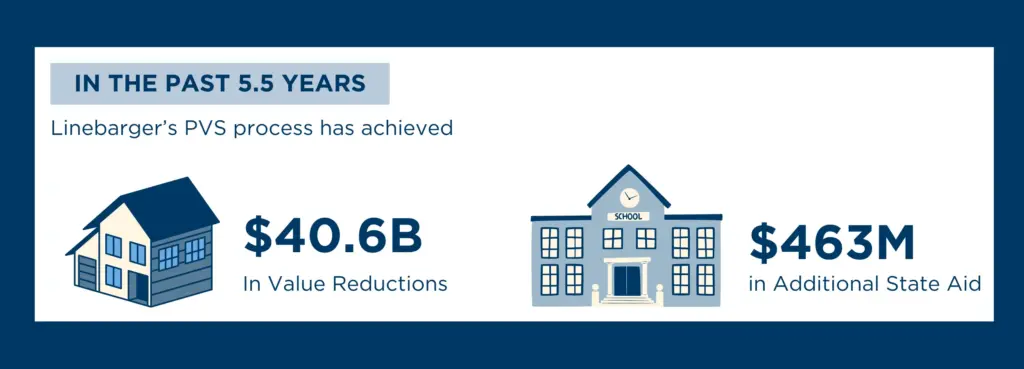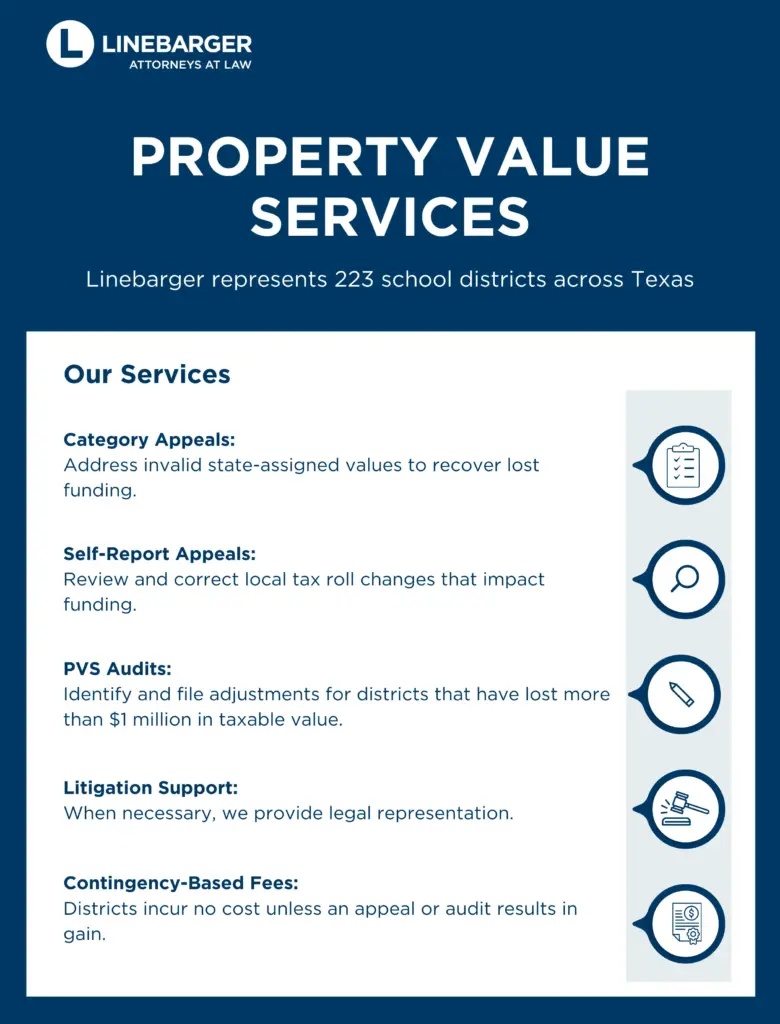Act Now to Prepare for the Property Value Study Process
September 15, 2025
By Jim Schiele

In August, the Texas Comptroller released its certified property values, which form the basis of Texas public school funding. What few districts realize is that now – not January – is the best time to decide whether to pursue a property value study (PVS) appeal or self-appeal.
Currently, Linebarger’s PVS clients receive personalized, comprehensive service. Our firm’s PVS Audit and Appeals Division is actively wrapping up 2022 school district property value studies and audits of the tax rolls will be finalized this fall.
Deadlines for other PVS audits are approaching next year, which is why I sat down with Robby Harbuck, Director, Property Value Study Appeals Division. Our conversation helps clear some of the confusion around the upcoming deadlines and sheds light on the next steps districts should consider this fall. Below is a transcript of our discussion.

Q: What’s happening right now in the PVS cycle?
A: The final values for the 2024 PVS were certified to TEA on August 15, 2025. If we identify a school district client with a potential issue, this is when we start the conversation about contracts and timelines.
This August 15, 2025 value certification also starts the three-year timeline for the 2024 SDPVS audit cycle, running until August 15, 2028. A district can file up to three audits for each cycle.
As far as the property value study process, those deadlines are ongoing, depending on what phase of the process you are in. For example, earlier this year, we finalized our 2021 School District Property Value Study (SDPVS) and the Texas Education Agency (TEA) posted the related payments throughout the spring and summer.
Right now, Linebarger’s PVS division is wrapping up the SDPVS for 2022. As part of this process, we have obtained the 2022 local tax rolls to complete our audit reviews. We will finalize our audits of the tax rolls for 2022 SDPVS audits this fall and winter.
We are confident in our process and our goal is to obtain for our school district clients the maximum financial gain to ensure no valuable revenue being left unclaimed.
For invalid school districts that were receiving a state fund assignment, we filed 2024 SDPVS category appeals in the spring of 2025. We completed working on these appeals this summer and the state certified the final values to TEA on August 15, 2025.
Q: I was contacted by a competitor firm warning that we are behind in filing 2022 and 2023 audits.
As noted above, we are currently reviewing the 2022 SDPVS data to determine whether audit filings would be beneficial. Each potential filing is carefully evaluated to ensure it supports a positive outcome for a school district.
It is still very early in the cycle to file 2023 SDPVS audits. There are two years remaining for further evaluation of the local appraisal rolls. Premature filings may not reflect the most accurate or beneficial data for districts. It’s important to note that filing an audit is not always beneficial. Linebarger conducts a thorough review of the data to ensure that any filing will result in a positive outcome for the district, rather than having an adverse effect.
Recently our clients have received unsolicited phone calls and emails from an outside school financial services organization. These calls and emails have contained inaccurate and potentially misleading information and have caused undue concern with clients.
Linebarger provides comprehensive SDPVS services, including both appeals and audits. In contrast, the competitor who contacted our clients offers limited services, focusing solely on audits without appeal support. This approach can leave districts vulnerable if appeal issues arise.
Q: What makes Linebarger different than this competitor?
Our process begins with a self-report appeal review, which allows for early correction of local adjusted rolls prior to certification to TEA.
This enables districts to receive additional funding during settle-up, rather than waiting years for audit results. The competitor does not conduct this review, requiring them to initiate and use up a district’s limited audits immediately. Remember, districts are limited to three audits. We choose the method and timing of those audits to benefit a district strategically.
Q: Should we be concerned about any upcoming deadlines?
A: Yes, the 2025 PVS will be released January 30, 2026—one day earlier than usual due to the calendar. That gives us only 40 days to gather data and file appeals, so districts need to be under contract and ready to go.
Q: What should school district leaders be doing now to prepare?
A: Look at your 2024 findings. If you’re in year two of grace, you’re likely out of grace for 2025 and at risk of losing funding.
If a district received a state fund assignment or is out of grace, they’re likely in jeopardy. We track all our clients and monitor others through delinquent tax lists. When the study is released, we reach out immediately. There’s only a 40-day window to act.
Districts should have a plan in place now—whether it’s with us, their appraisal district, or another firm.

Q: What happens if a school district can’t get board approval in time?
A: We move forward with an informal agreement. Most boards approve quickly once they understand the urgency. We don’t leave districts hanging.
Q: Are more school districts becoming invalid?
A: Actually, the trend is improving. In 2019, there were 220 invalid districts. That number dropped to 113 in 2024. Markets have stabilized due to interest rates, and we expect fewer invalids in 2025.
Q: Can school districts still file audits for previous years?
A: Yes. For example, 2022 audits can be filed until August 24, 2026. Audits address local value changes, while appeals fight state-assigned values. Both are important for recovering lost funding.
Q: What’s the difference between a category appeal and a self-report appeal?
A: Category appeals fight the state’s assigned value to bring it closer to the local value. Self-report appeals correct changes in the local tax roll—like late exemptions or ARB hearings—that TEA doesn’t automatically account for.
Q: Do appraisal districts file these appeals themselves?
A: Rarely. Most don’t have the staff or expertise. In 2024, we filed 190 appeals—33 category and 157 self-reports. Many districts were valid but still benefited from self-report appeals.
Q: What about homestead exemptions and their impact?
A: Late-filed homesteads increase deductions and reduce taxable value. We catch those through audits. If the mandatory exemption amount increases to $140,000, school districts will collect less, especially on debt service. TEA will hold districts harmless, but only for existing debt. The exemption cap reduces a district’s capacity to issue additional debt, which could hamper capital programs that have already been approved by taxpayers as well as future capital programs.
Q: Can you share a success story?
A: In 2024, we helped an independent school district move from invalid to valid. Their state-assigned value was $1.57 billion, and we reduced it to $1.44 billion through category and self-report appeals—resulting in an estimated $2.2 million in aid gain. We had five team members working on that case, including appraisers on the ground, to accomplish this.
Q: What’s the cost to districts for your services?
A: We work on contingency. If there is no benefit to the district, there’s no fee. We do not bill until TEA makes adjustments and payments. Many districts do not budget for this, but our fee is typically paid out of this additional aid gain.
I want to thank Robby Harbuck for his thoughtful answers and for taking time to answer our questions. If you have additional questions, feel free to contact me for assistance.
Jim Schiele is Linebarger’s School Financial Consultant. He offers free assistance to Linebarger school district clients as they navigate budgets and meet financial deadlines. He can be reached at jim.schiele@lgbs.com.
This content is intended and provided solely for educational and/or informational purposes. It is not intended to provide legal advice, nor does your receipt of this content create an attorney-client relationship. This content is not a substitute for the specific legal advice of an attorney licensed in your jurisdiction.
If you are a current or prospective client this content may be subject to the attorney-client privilege or the attorney work product privilege or otherwise be confidential. Any dissemination, copying or use of this content by or to anyone other than the designated and intended recipient(s) is unauthorized.